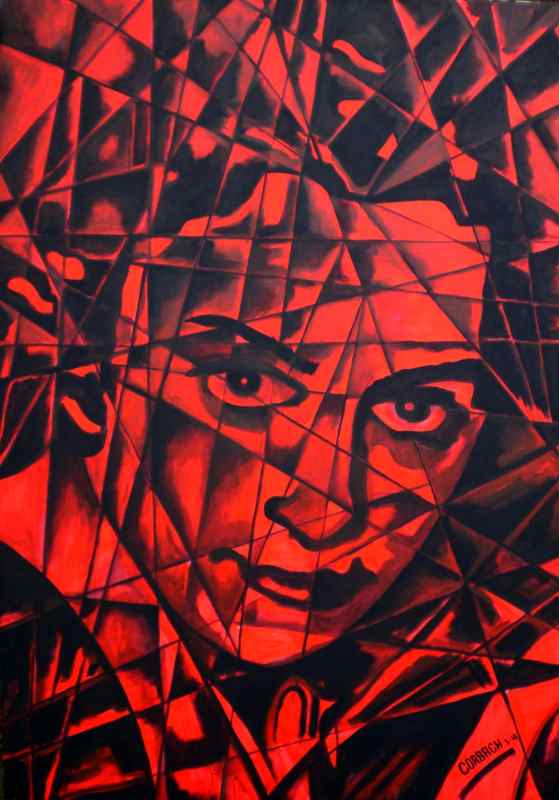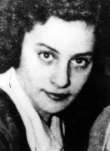
Meinungen aus Kunstnet.de zu diesem Bild:
Von Nurso:
"Unerträgliches Leid.............
und doch Hoffnung.
Stimmt mich sehr nachdenklich. "
Von Michael Bruns:
"
Tolles Bild, toller Gedanke, bewegende Geschichte, ein Stück Menschheitsgeschichte . Super Werk kann ich nur sagen.
Gruß Micha "
Von Tamare:
"Berührende Bilderinnerung,
mit starkem Text dazu.
LGTam "
Von Winfried W999R :
"Hallo Simone!
Tolles Bild, mit einer Geschichte, die mich sehr mitgenommen hat.
Wunderbare Arbeit.
Wünsche Dir einen wunderschönen Tag.
Herzliche Grüße
Winfried "
Von loerci:
"
Die Vergangenheit hat uns geprägt, aber das Morden geht weiter...
soll man hoffen oder..... ?? LG "
 Ester Wajcblum
Ester Wajcblum
‚Wir könnten uns von dieser Hölle befreien...'
(geboren am 16.01.1924 in Warschau, Polen - ermordet am 05.01.1945 in Auschwitz)
Nach ihrer Deportation in das Konzentrations- und Vernichtungslager Auschwitz muss die 1924 in Warschau geborene Ester Wajcblum als Häftling in der Metallfabrik Metall-Union arbeiten. Dort gelingt es ihr, Schießpulver zu entwenden und in das Lager zu schmuggeln, wo sie Kontakt zur jüdischen Untergrundbewegung hat. Am 7. Oktober 1944 wird das Krematorium III im Vernichtungslager Auschwitz von den Häftlingen des Sonderkommandos gesprengt, vier SS-Leute werden getötet, andere verletzt. Nach dem Aufstandsversuch des Sonderkommandos wird Ester Wajcblum verhört und geschlagen, kann aber ihr Geheimnis bewahren. Später erfährt die SS bei dem Verhör einer Mitverschworenen, dass Ester Wajcblum Sprengstoff geschmuggelt hat. Zusammen mit anderen Verschwörern, unter ihnen auch Rosa Robota, Ala Gertner und Regina Safirsztain,
wird sie am 5. Januar 1945 öffentlich gehenkt.
Jahre nach der Ermordung von Ester Wajcblum berichtet eine Mitgefangene:
„Etwa im Frühjahr 1943 kam ein Transport aus Warschau, darunter auch zwei Schwestern – Ester und Hanna Wajcblum... Es war ihnen untersagt, sich mit anderen Häftlingen im Lager zu treffen. Trotzdem habe ich mit beiden Schwestern heimlich verkehrt. Eines Tages überreichte mir Ester Wajcblum ein kleines, leichtes Päckchen, mit der Bitte, ich möchte es aufbewahren, bis sie oder jemand anderer, den sie schicken wird, es abholt... Nach einigen Tagen kam zu mir Rosa Robota, welche in der Bekleidungskammer arbeitete, und verlangte das Päckchen. Dies wiederholte sich mehrmals... In den Päckchen war, wie ich später erfuhr, das von den Union Werken herausgeschmuggelte Schießpulver. Ester sprach nie darüber, nur einmal sagte sie zu mir: ‚Wir könnten uns von dieser Hölle befreien...'“
Ester starb nur 22 Tage vor der Befreiung des KZ Auschwitz-Birkenau.
Elf Tage nach ihrer Ermordung wäre ihr 21. Geburtstag gewesen.
Um drei Uhr nachmittags am 27. Januar 1945 trafen die ersten sowjetischen Soldaten im KZ Auschwitz und Auschwitz-Birkenau ein. Ihnen bot sich ein Bild des Grauens: Allein vor den Baracken von Birkenau finden sie die Leichen von mehr als 600 Menschen. Die etwa 7000 Häftlinge, die von den Nationalsozialisten bei der Räumung des Lagers zurückgelassen wurden, waren dem Tode näher als dem Leben.
Einige Tage später findet die Untersuchungskommission der sowjetischen Armee Eisenbahnwaggons, beladen mit 368 820 Herrenanzügen, 836 255 Damenmänteln, 5525 Damenschuhen, 13 964 Teppichen, große Mengen Kinderkleidung und Hausrat und in einer Lederfabrik nahe des Lagers 7 Tonnen Menschenhaar.
Auschwitz, die oberschlesische Stadt in der Nähe von Krakau ist ein Synonym für den beispiellosen Völkermord der Nazi-Diktatur an europäischen Juden, Sinti und Roma und für die Ermordung Oppositioneller, Homosexueller und Behinderter.
_____________________________________________________________________________
Ester Wajcblum
‘We could free ourselves from this hell...'
(born in January 16, 1924 in Warzaw, Poland - killed in January 05, 1945 in Auschwitz)
Deported to Auschwitz concentration and extermination camp, Ester Wajcblum, born in Warsaw in 1924, worked in the Metall-Union metal factory as a prisoner. She managed to steal gunpowder at work and smuggle it into the camp, where she was in contact with the Jewish underground movement. On October 7, 1944, special detachment prisoners blew up Crematorium III of Auschwitz extermination camp, killing four SS men and injuring several others. After the special detachment's attempted revolt, Ester Wajcblum was interrogated and beaten, but did not betray her secret. During the interrogation of one of her fellow conspirators, the SS later found out that Ester Wajcblum had smuggled explosives. She was publicly hanged along with other conspirators, including Rosa Robota, Ala Gertner and Regina Safirsztainon in January 5, 1945.
Years after Ester Wajcblum's murder, one of her fellow prisoners reported:
“Around the spring of 1943, a transport came from Warsaw, including two sisters – Ester and Hanna Wajcblum... They were forbidden from meeting up with other prisoners in the camp, but I still had contact to the two sisters in secret. One day Ester Wajcblum handed me a small, light parcel, asking me to keep it safe until she came for it or sent someone else... A few days later, Rosa Robota, who worked in the clothing section, came to me and asked for the parcel. This happened several times... I later found out that the parcel contained gunpowder smuggled out of the Union factory. Ester never spoke about it, only once did she say to me: ‘We could free ourselves from this hell...'”
| Her story: Ester, known as Estusia, was born in Warsaw, Poland. She was the
second-born child of Jakub and Rebeka , who were deaf-mutes. After
the Nazi invasion of Poland, Estusia and her family were forced
into the Warsaw Ghetto. Luckily, her older sister Sabina and her
husband Mieczyslaw Zielinski managed to escape Poland and find refuge
in the Soviet Union during the war. In May of 1943, the remaining
family members were deported to Majdanek, where Jakub and Rebeka
were murdered on arrival. That September, Estusia and her younger
sister Hanka were put on a transport to Auschwitz-Birkenau and selected
for labor at the Union Munitions factory. Estusia and Hanka made
the acquaintance of Ala Gertner, who was involved in the camp's
resistence movement, and soon found themselves involved in a plot
to stage an uprising orchestrated by the Sonderkommandos. Their
job was to set aside a bit of gunpowder and smuggle it out of the
factory every day. They were able to do this because the room of
the factory they were working in was the only place in Auschwitz
where prisoners had access to gunpowder. The other brave young women
who risked their lives to smuggle out gunpowder were Róza
Robota, Regina Safirsztajn, Marta Bindiger, Inge Frank, Genia Fischer,
Ruzia Grunapfel, Hadassah Zlotnicka, and several others. They did
this for over a year, all the while the Sonderkommandos at the end
of the smuggling chain assembling the gunpowder into bombs and grenades
which they then buried near the crematoria. On 7 October 1944, Crematorium
IV was blown up, although the uprisings in the other crematoria
were put down before they were able to get that far. In retribution
for what had happened, every third Sonderkommando was shot. An investigation
into how this could have happened went on for weeks, and the gunpowder
was finally traced back to Ala's factory. All of the women working
in the factory were interrogated and tortured, and eventually Estusia,
Ala, Róza, and Regina were betrayed. Although they in turn
were tortured and interrogated even harder over the next few months,
they refused to give in and reveal any more information or names
other than the names of Sonderkommandos who had been killed already.
In late 1944, Estusia smuggled a note to her little sister Hanka
from the prison block she was being held in, saying "Not for me
the glad tidings of forthcoming salvation; everything is lost and
I so want to live." Estusia got a promise from Marta that she would
protect Hanka and keep her alive no matter what, and that she wouldn't
let anyone betray Hanka's role in the uprising. Thanks to Marta,
Hanka did survive. Estusia and the other three women were publicly
hanged on 5 January 1945, two weeks before the camp was evacuated.
Their last words, according to survivors, were said to be either
"Be strong!" or "Revenge!" In 1991 a memorial at Yad Vashem was
dedicated to the four of them, recognising their act of heroism.
|
|
Burial: |
Created by: Carrie-Anne Record added: Nov 27, 2006 Find A Grave Memorial# 16811768 |
Read also:
http://www.ushmm.org/research/center/lerman/medal_award/award.php?content=auschwitz